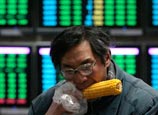
PHNOM PENH, June 25 (Xinhua) -- A group of business executives from China's Hong Kong Special Administrative Region has been visiting Cambodia to seek possibilities to broaden bilateral trade and investment ties.
The delegation is comprised of leaders of 24 firms doing businesses in financial and professional services, infrastructure and real estate, garments and textiles, telecommunications, food and chemicals, according to Raymond Yip, assistant executive director of Hong Kong Trade Development Council.
The group is led by John C Tsang, financial secretary of the Hong Kong Special Administrative Region.
Speaking during a Business Luncheon in Phnom Penh on Tuesday, John C Tsang said that Hong Kong entrepreneurs were among the earliest and most prolific investors in Cambodia.
"They bring not only capital investment to Cambodia, but also a great deal of experience in manufacturing, in developing effective supply chains, in adopting new technologies and in identifying new growth opportunities," he told the event, which was attended by Cambodian trade officials, businesspeople and bankers.
Cambodia is the delegation's first leg of the two Southeast Asian nations visit from June 24-29 in order to strengthen economic partnership with the member states of the Association of Southeast Asian Nations (ASEAN). Their next stop will be Myanmar.
"Hong Kong will continue to strengthen links with Cambodia and promote free and open trade in the region," he said. "Through this visit, I hope that we can forge even closer ties with Cambodia and Myanmar."
Addressing the Business Luncheon, Cambodian Minister of Commerce Cham Prasidh highly spoke of good trade and investment relations between Cambodia and China in general and between Cambodia and Hong Kong in particular.
"The visit is very important to further broaden trade and investment links between Cambodia and China's Hong Kong," he said.
Hong Kong is Cambodia's 6th largest trading partner and is the 5th largest source of imports, the minister said. Currently, some 56 Hong Kong-owned garment and footwear factories are operating in Cambodia, employing some 35,000 workers.
Bilateral trade between Cambodia and Hong Kong valued at 879 million U.S. dollars in 2012, a 18 percent rise year-on-year, he said.
Cambodia's export to Hong Kong was 68 million U.S. dollars, up 50 percent, while Hong Kong's export to Cambodia reached 811 million U.S. dollars, up 25 percent.
Meanwhile, Cham Prasidh said Cambodia now enjoys full political stability, sound macro-economic stability, and good and transparent legal framework, which are essential components for investors to make decision for their investment.
He said the country has been encouraging investments in agriculture, transport and telecommunication infrastructure, energy and electricity sectors, labor-intensive industries and export-oriented manufacturing, and tourism.
During the stay in Cambodia, the delegation will meet with Chea Vuthy, vice secretary general of the Council for the Development of Cambodia, deputy prime minister and finance minister Keat Chhon, and deputy governor of the National Bank of Cambodia Neav Chanthana, as well as chairman of Cambodian Chamber of Commerce Kith Meng.
The group will also pay a courtesy call on Prime Minister Hun Sen on Tuesday afternoon, Cham Prasidh said.


















![]()
